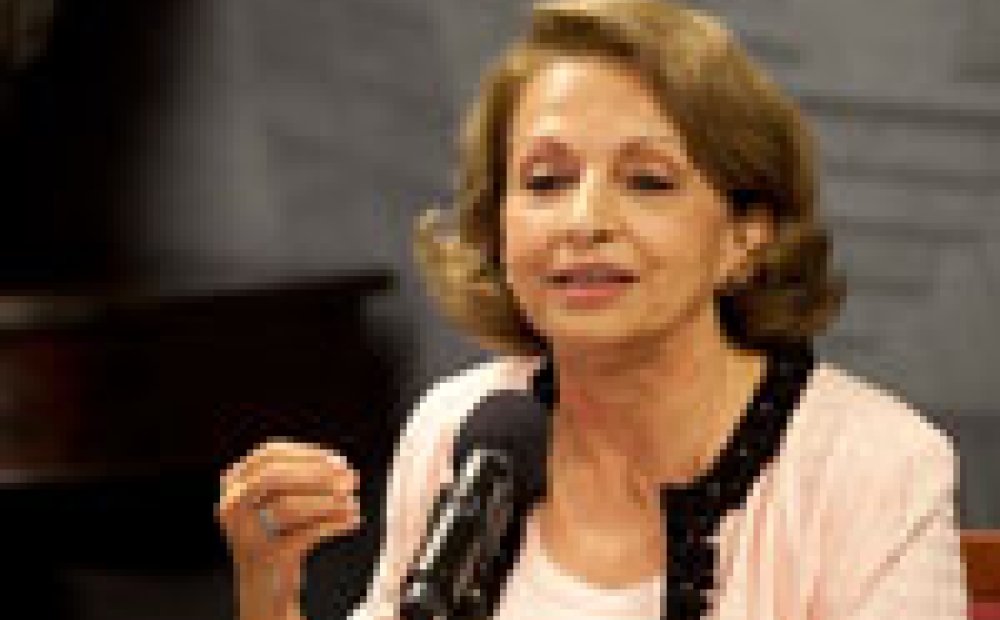Words, Not Swords: Iranian Women Writers and the Freedom of Movement

Farzaneh Milani, Professor of Persian Literature and Women's Studies and Chair of the Department of Middle Eastern and South Asian Languages and Cultures at the University of Virginia, discussed the connections between gender, space, and physical mobility against the backdrop of the Arab Spring and demonstrations in Iran.
On June 1, the Middle East Program hosted a book talk, Words, Not Swords: Iranian Women Writers and the Freedom of Movement, with Milani. Haleh Esfandiari, Director of the Middle East Program at the Wilson Center, moderated the event.
Milani introduced her talk by positing that women's bodies and women's voices are interrelated and that prohibiting movement analogously stifles expression. She cautioned against "fetishizing" the veil and noted the paradox that the veil can be a sign and symbol of segregation as well as a means of desegregation. Gender apartheid, she said, is a function of space and control of women's freedom of movement, not of the veil.
Regarding the role of women in the recent demonstrations and revolutions across the Middle East and North Africa, Milani praised the desegregated nature of the protests. Women, young and old, veiled and unveiled, walked shoulder to shoulder with men in unprecedented numbers. The significant and highly visible role that women have played in these protests is a "revolution within revolutions." Women are indeed at the forefront of these moderating, modernizing movements. In particular, Milani commented on the case of Saudi women pursuing the right to drive as a reflection of the connections between mobility and power, and the desire of women to gain access to the public sphere.
Milani discussed the history of ideal femininity as stationary and silent. She emphasized that restricting women's mobility is not the monopoly of any single faith, culture, or country. Milani observed that for instance feminine ideals of beauty often emphasized tiny feet. By contrast, perceptions of flawed femininity have drawn on images of women in motion, those who "walk the streets" or, like witches, ride broomsticks or bicycles. Milani stated that "freedom of movement is central to gender equity." Segregation, through the control of space and women's freedom of movement, impacts women's lives in several ways. It curtails their access to education and centers of power; it impedes their participation in the public forms of art and the labor force.
Addressing the realms of art and literature in Iran, Milani noted that although women have long "ruled supreme" in the production of private art forms, such as lullabies, stories, carpet weaving, cooking, knitting, and embroidery, they have only recently become major producers of public forms of art. In focusing on Iranian history, Milani related that although there have been many individual women poets in the Pantheon of Persian literature, the establishment of a tradition of women writers is a more recent development that she traces back to Tahirih Qurratul'Ayn, a poet and women's activist in the mid-19th century. Milani contends that in spite of all obstacles or perhaps because of them, there is a "renaissance of women writing." Unprecedented numbers of women write poetry, novels, and short stories. More than two thousand women work in the publishing industry. Several women win prestigious literary awards.
Iranian women, said Milani, have invaded previously all-male territory.
By Laura Rostad, Middle East Program
Speakers

Hosted By

Middle East Program
The Wilson Center’s Middle East Program serves as a crucial resource for the policymaking community and beyond, providing analyses and research that helps inform US foreign policymaking, stimulates public debate, and expands knowledge about issues in the wider Middle East and North Africa (MENA) region. Read more


Environmental Change and Security Program
The Environmental Change and Security Program (ECSP) explores the connections between environmental change, health, and population dynamics and their links to conflict, human insecurity, and foreign policy. Read more
